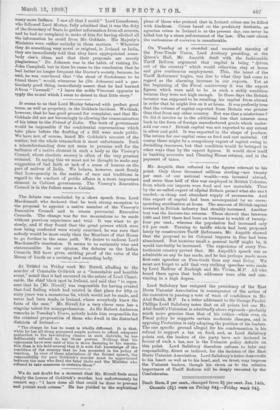Mr, Asquith then referred to the figures relevant to his
point. Only three thousand millions sterling—not twenty per cent. of our national wealth—was invested abroad, and more than half of this was employed in British Colonies, from which our imports were food and raw materials, Thus by the so-called export Of clpital Britain gained what she mo:. t needed,—a cheap and abundant supply of necessaries, And this export of capital had been accompanied by no corre- sponding sterilisation at home. The amount of British capital invested in British industry had steadily increased. Another test was the Income-tax returns, These showed that between 1898 and 1907 there had been an increase in wealth of twenty- four per cent., whereas the population had increased only 83 per cent. Turning to tariffs which had been proposed. lately by constructive Tariff Reformers, Mr. Asquith showed that the proposal to let Colonial imports in free had been abandoned. But however small a general tariff might be, it would inevitably be increased. The experience of every Pro- tectionist country proved that. Mr. Asquith's speech was as admirable as any he has made, and he has perhaps made more firat-rate speeches on Free-trade than any man living. We must not forget to add that very striking speeches were made by Lord lialfour of Burleigh and Mr. Vivian, M.P. All who heard them agree that both addresses were able and con- vincing in a high degree. .–...-- .-------






































 Previous page
Previous page